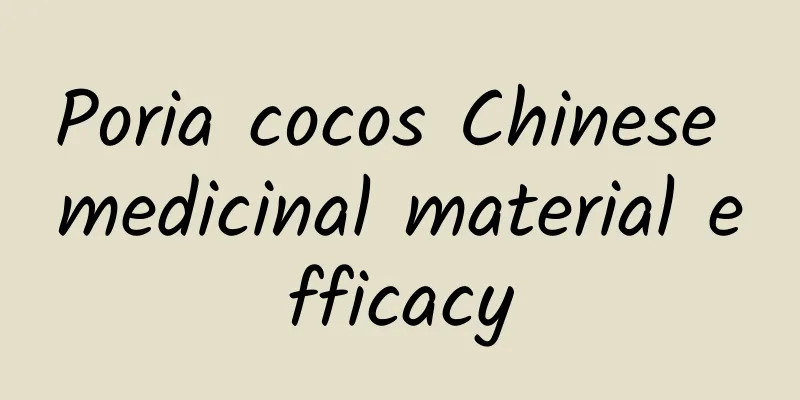Poria cocos Chinese medicinal material efficacy

|
I believe many people know that Poria cocos is a traditional Chinese medicine, but what are the effects of Poria cocos? This is something that many people find very unfamiliar. Although Poria cocos is a traditional Chinese medicine, it can also be used to make food. When using Poria cocos to make food, many people will choose to add meat or bone food to Poria cocos, because Poria cocos is very nutritious, and it is more valuable if bones are added to eat together. So what are the effects of this Poria cocos traditional Chinese medicine? In fact, Poria cocos is not only a traditional Chinese medicine with high medicinal value, but also an indispensable health care product for daily health care. Eating Poria cocos not only protects the spleen and stomach, but also has a good health care effect on our psychology. It can be said that Poria cocos can produce different effects when combined with different traditional Chinese medicines. Poria can treat symptoms such as difficulty in urination, edema, cough due to phlegm and fluid, vomiting, nausea, diarrhea, spermatorrhea, stranguria, palpitations, and forgetfulness. The diuretic effect of Poria cocos is achieved by strengthening the spleen and lung functions, which is different from other Chinese medicines that directly promote diuresis. Ling Gui Zhu Gan Tang, Si Jun Zi Tang, and Si Ling Tang are all commonly used prescriptions that contain Poria cocos. 1. Used for symptoms such as difficulty urinating and edema. Poria cocos has the function of promoting diuresis and eliminating dampness, and its medicinal properties are mild. It can promote diuresis without hurting the body's vital energy, making it an important medicine for promoting diuresis and eliminating dampness. It can be used for any symptoms of difficult urination and stagnant water, regardless of whether they are caused by cold and dampness, dampness and heat, or spleen deficiency and dampness. If the condition is more cold and damp, it can be used with cinnamon twig, white atractylodes, etc.; if the condition is more damp and hot, it can be used with Poria cocos, Alisma orientalis, etc.; if the condition is spleen deficiency, it can be used with Codonopsis pilosula, Astragalus membranaceus, white atractylodes, etc.; if the condition is deficiency-cold, it can also be used with aconite, white atractylodes, etc. 2. Used for diarrhea and leukorrhea caused by spleen deficiency. Poria can both strengthen the spleen and drain dampness. It can treat both the symptoms and the root cause of diarrhea and leukorrhea caused by spleen deficiency and dysfunction of metabolism. It is often used in combination with Codonopsis pilosula, Atractylodes macrocephala, Chinese yam, etc. It can be used as an auxiliary medicine for nourishing the lungs and spleen and treating qi deficiency. 3. Used for cough caused by phlegm and dampness entering the meridians, and shoulder and back pain. Poria can not only promote diuresis and eliminate dampness, but also strengthen the spleen. It has a therapeutic effect on the symptoms of spleen deficiency, inability to transport and transform water and dampness, and accumulation of phlegm and dampness. It can be used together with Pinellia and dried tangerine peel, or with cinnamon twig and Atractylodes macrocephala. It can be used together with Pinellia ternata and Citrus aurantium to treat phlegm and dampness entering the meridians, shoulder and back pain. 4. Used for palpitations, insomnia and other symptoms. Poria cocos can nourish the heart and calm the mind, so it can be used for symptoms such as restlessness, palpitations, insomnia, etc. It is often used in combination with ginseng, polygala, and spinach seeds. Poria cocos has powerful effects. Most people choose Poria cocos to treat some diseases. Poria cocos has many medicinal properties and is very valuable in traditional Chinese medicine. You can choose to make tea with Poria cocos, but don’t make the tea too strong, as this will affect your health. Poria cocos can also be used to make tea, but don’t put too much Poria cocos in the water. |
<<: The efficacy and function of Acorus calamus
>>: Is Poria cocos the same as white Poria cocos?
Recommend
Summer hibernation, winter hibernation...are there such lazy fish?
Here’s some fun fact for you: All vertebrates sle...
What is the core of what Liu Genghong said? Don’t wait until you get hurt to understand!
Mixed Knowledge Specially designed to cure confus...
The efficacy and taboos of Pingyin Rose
Pingyin County produces roses, and its cultivatio...
How many people have been harmed by eating while it's hot! When eating, don't let the food exceed this temperature!
"Hurry, eat it while it's hot, it's ...
Popular Science Cartoon | How did cholera spread?
On July 9, Wuhan University reported a suspected ...
Red alert! Typhoon Trami's remnant vortex triggers heavy rains. How to avoid risks scientifically?
This year's 20th typhoon "Trami" ma...
Why did ancient wooden ships not leak at sea? It's all thanks to this traditional sealing skill!
Since ancient times, China's shipbuilding ind...
Does Panax notoginseng powder harm the liver?
Panax notoginseng is a very common nourishing Chi...
Technology News | Self-reproducing living robot is launched
[Today's cover] On the 30th, Mount Tai after ...
You may not have heard of "Pistachio", but you have definitely eaten it!
Today’s hot topic comes from this guy in the comm...
Developing new quality productivity - "her power" in new technology
Putting on a white work suit and a mask, 49-year-...
The efficacy and function of crucian carp
The world is full of wonders, and Chinese medicin...
The efficacy and function of thunder balls
Lei Wan is a familiar medicinal material with unu...
The efficacy and function of Artemisia annua
There are many common Chinese medicinal materials...






![[Pearl Science] A Scientific Look at Nano Pearl Powder](/upload/images/67f0f3eb5625b.webp)


